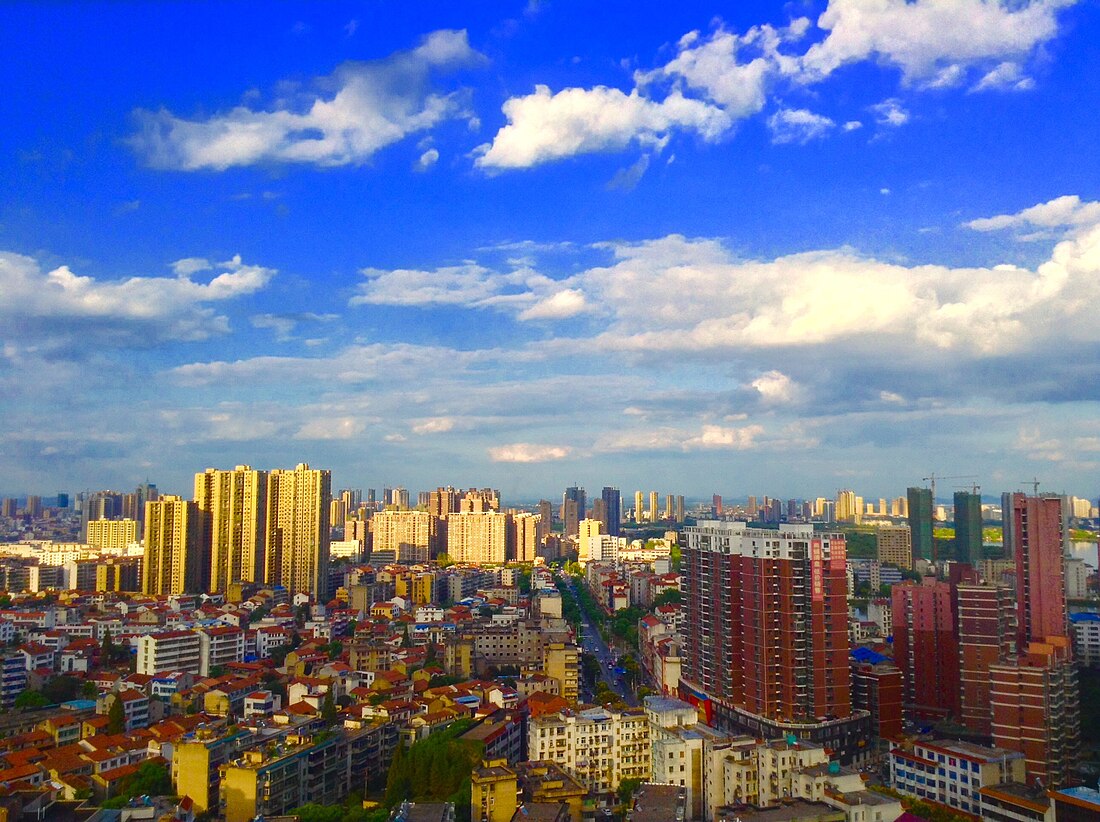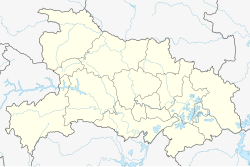Top Qs
Timeline
Chat
Perspective
Huanggang
Prefecture-level city in Hubei, People's Republic of China From Wikipedia, the free encyclopedia
Remove ads
Huanggang is a prefecture-level city in easternmost Hubei Province, China. It is situated to the north of the middle reaches of the Yangtze River and is bounded in the north by the Dabie Mountains and is named after Mount Huanggang.[1] It borders Henan in the north, Anhui in the east and Jiangxi in the south.
The city's administrative area covers 17,453 square kilometers (6,739 sq mi) and the total population was 5,882,719 as of the 2020 census whom 456,862 resided in the Huangzhou urban district, making it the second most populous city in the province by administrative population, after Wuhan,[4] the provincial capital. the Ezhou – Huanggang built-up (or metro) area was home to 1,152,559 inhabitants comprising (Echeng district and Huangzhou district of Huanggang), and many of its residents work in Wuhan.[4] In 2007, the city is named China's top ten livable cities by Chinese Cities Brand Value Report, which was released at the 2007 Beijing Summit of China Cities Forum.[5]
Remove ads
History

In 845 BC Marquis Wen (文侯) Huang Meng (黃孟; also known as Huang Zhang / 黃璋) moved the capital of the State of Huang from Yicheng to Huangchuan (present-day Huangchuan, Henan). Huang Xi's descendants ruled State of Huang until 648 BC when it was destroyed by the State of Chu. The Marquis of Huang, Marquis Mu (穆侯) Huang Qisheng (黃企生), fled to the state of Qi. The people of Huang were forced to relocate to Chu. They settled in the region of present-day Hubei province, in a region known as the Jiangxia Prefecture (江夏郡) during the Han dynasty (206 BC – AD 220). There are many places in this region today that were named after Huang e.g. Huanggang, Huangpi, Huangmei, Huangshi, Huangan, Huangzhou etc. Many of the people of Huang were also relocated to regions south of the Yangtze River. During the reign of Emperor Cheng of Jin, Later Zhao forces inflicted great damage on many Jin cities and bases north of the Yangtze and captured Zhucheng (邾城, in modern Huanggang, Hubei). Huanggang has a history of at least 2,000 years.[1]
Remove ads
Administration
Huanggang administers 12 county-level divisions, including one district, two county-level cities and seven counties:[6][7][1]
Remove ads
Climate
Cultural heritage
Huanggang is home to several significant cultural sites of historical interest, such as the Buddhist Ancestral Hall of Sakyamuni at Doufang Mountain, Wuzu Temple and its Changchun Nunnery, and Dongpo Red Cliff.[citation needed]
Education
Huanggang Normal University is a full-time institution of higher education located in the city of Huanggang.
Economy
Huanggang has a diversified economy, ranging from bio- and herbal medicine to manufacturing, agriculture, and tourism. Since ancient times, Huanggang has been renowned for local specialties such as the "Qichun Four Treasures" (snake, turtle, bamboo, and moxa), Huangmei "tiaohua" embroidery, and Wuxue "zhangshuiqian" bamboo products. Today, Huanggang at large is recognized for organic vegetables. With its "Guihuaxiang" brand of chestnuts, Luotian is the leading chestnut-growing county in all of China. Yingshan is famous for its "cloud mist" green tea. Qichun, of course, is famous for herbal medicine. Macheng is a national model county for cattle breeding. Huangmei is a major center of freshwater shrimp and fragrant jade rice production. And Hong'an peanut production ranks the first in Hubei Province.[citation needed]
Remove ads
Transportation
Summarize
Perspective
Huanggang enjoys an excellent transportation infrastructure. Wuhan airport is 90 kilometers (56 mi) to the west, while Jiujiang Airport in Jiangxi to the east is 160 kilometers (99 mi) away. Being on the Yangtze River, Wuhan main port is located 80 kilometers (50 mi) away, and Huangzhou District has a small bulk-handling port. There is an extensive road network, with three north–south and seven east–west major roads within the main city area. The city also is served by several new expressways, including the north–south "Jingzhu" (Beijing to Zhuhai, Guangdong) expressway and the east–west Wuhan to Shanghai expressway. Huanggang also is on the main north–south "Jingjiu" (Beijing to Hong Kong) and "Jingguang" (Beijing to Guangzhou, Guangdong) railway lines.[citation needed]
Bridges

Two bridges connect Huanggang across the Yangtze to the Ezhou on the south bank of the river:
- Ehuang Bridge, between the main urban area of Huanggang and Ezhou; it carries the China National Highway 106.
- Edong Bridge carries the G45 Daqing–Guangzhou Expressway and the G50 Shanghai–Chongqing Expressway.
Other river crossings near Huanggang include:
- Jiujiang Yangtze River Bridge, between Huangmei County and Jiujiang; a combined road-rail bridge, it carries the Huangxiao Expressway, China National Highway 105, and the Beijing–Kowloon railway
- Huangshi Bridge, which carries the Huanghuang Expressway from Xishui County to Huangshi
Rail
Huanggang is served by the Beijing–Kowloon Railway, which has several stations within the prefecture-level city. The Huangzhou Station, located within Huangzhou District some 20 km (12 mi) northeast from downtown Huanggang, has the best service of all, with several trains a day to Beijing, Nanchang, and Shenzhen.[10] Huanggang travelers can also use the Huangshi station on the Wuhan–Jiujiang Railway, across the river.[citation needed]
Remove ads
Famous people
Summarize
Perspective
Huanggang prefecture is the birthplace of numerous famous Chinese inventors, scientists, and scholars, including:
- Bi Sheng (毕昇), the inventor of movable type printing (Also known as one of the Four Great Inventions);
- Dayi Daoxin (四祖道信), the 4th Patriarch of Chán(Zen) Buddhism;
- Daman Hongren (五祖弘忍), the 5th Patriarch of Chán Buddhism;
- Li Shizhen (李时珍), herbalist and author of the ancient medical classic Compendium of Materia Medica;
- Cheng Yi (程颐), ancient idealist philosopher;
- Cheng Hao (程顥), founder of Neo-Confucianism, philosopher and politician in the Song dynasty;
- Dong Biwu (董必武), Acting President of the People's Republic of China, 1972–1975;
- Li Xiannian (李先念), former military leader and President of China;
- Lin Biao (林彪), former military leader and Vice President of China. One of the ten marshals in China;[11]
- Chen Tanqiu (陈谭秋), a founding member of the Chinese Communist Party (CCP)
- Bao Huiseng (包惠僧), a founding member of the Chinese Communist Party (CCP)
- Li Siguang (李四光), ethnic Mongol ecologist;
- Wei Wenbo (魏文伯), former political leader and Minister of Justice of the People's Republic of China
- Wen Yiduo (闻一多), patriotic poet;
- Xiong Shili (熊十力), a 20th-century Chinese philosopher;
- Huang Kan (黄侃), a Chinese philologist.
As well, Huanggang is famous for producing military and political leaders. Hong'an County is known as the "County of Generals" in that more than 400 Chinese army generals have been born there, a total far greater than for any other county in all of China. In addition, former military leader and President of China, Li Xiannian (1909–1992), was born in Hong'an. The family of Taiwanese author Kuo Cheng came from Huanggang.[12]
Remove ads
References
External links
Wikiwand - on
Seamless Wikipedia browsing. On steroids.
Remove ads








